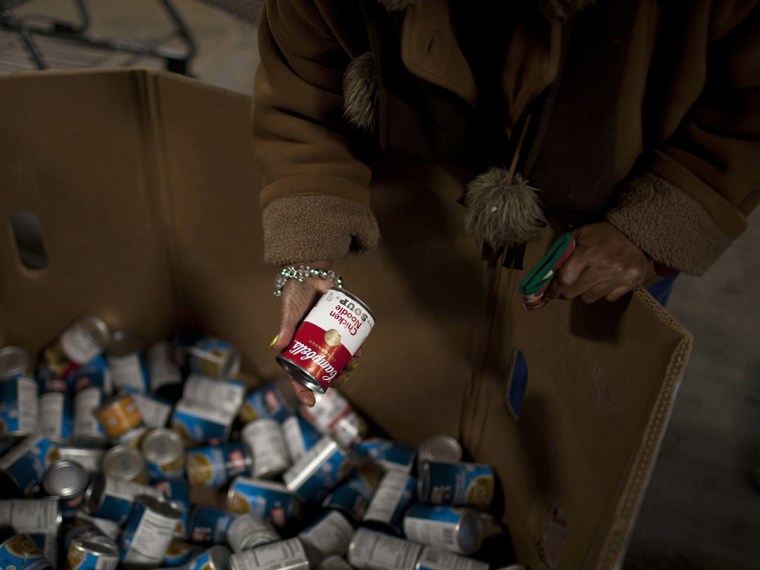Updated, 6:50 p.m. ET
Conservative Republicans in the House passed a bill that will cut $39 billion from food stamps over the next decade, according to estimates from the Congressional Budget Office.
Passed in a 217 to 210 vote, the bill--supported only by Republicans--amends the Supplemental Nutrition Assistance Program (SNAP) with an number of new provisions expected to knock nearly 4 million people out of the program in 2014, and an average of nearly 3 million people each year through 2023.
This is the second version of the food stamps bill pushed by House Republicans this year, after an earlier plan to cut $20.5 billion failed to pass the House--in part because many conservative Republicans believed the cuts were insufficient.
This version of the legislation, split off from the rest of the farm bill after the plan to cut $20.5 billion was rejected, creates new provisions that nearly double cuts, primarily by imposing new work requirements for able-bodied adults without dependents between the age of 18 and 50, limiting them to three months of benefits in a three-year period unless they work part-time, or are in a job-training program. Currently, those recipients can obtain waivers during times of high unemployment.
According to analysis from the Center on Budget and Policy Priorities, the bill allows states to cut people out of the program "even if they are actively looking for work, even if they’re on a waiting list for job training, and even if they’re working, but for less than 20 hours a week while they try to find a full-time job."
According to CBO estimates, that provision alone will drop 1.7 million people out of the program in 2014, and an average of 1 million people each year over the next decade. Another provision restricting eligibility requirements could cut an average of 1.8 million people a year over the next decade.
The CBO also estimates that 12 million people will "naturally" leave the food stamps program over the next decade as the economy improves, without any legislative changes to the program.
Like many bills championed by the most conservative members of the House, the bill has little chance of making it through the Senate in its current form. The Senate's version of the bill cuts only $4 billion from the food stamp program. Debbie Stabenow, chairwoman of the Senate Agriculture Committee, slammed the House's bill in a statement released shortly after the vote.
"We have never before seen this kind of partisanship injected into a Farm Bill," she said in a statement. "Not only does this House bill represent a shameful attempt to kick millions of families in need off of food assistance, it's also a monumental waste of time. The bill will never pass the Senate, and will never be signed by the President."
But she indicated she was hopeful that a reasonable solution could be found when House and Senate conferees come together to resolve their respective bills.
"The good news is now that this vote is behind us, we are close to the finish line. If House Republican leaders drop the divisive issues, appoint conferees and work with us in a bipartisan way, we can finalize a farm bill that creates jobs, reforms agriculture policy, and reduces the deficit by tens of billions of dollars. It's time to get a comprehensive farm bill done to give farmers and ranchers the certainty they need to continue growing the economy."
Ultimately 15 Republicans joined Republicans to oppose the bill, including Rep. Peter King of New York, who told reporters Wednesday he thought it went too far.
"It's just too much, too quick, and we can't be talking about possibly shutting the government down at the same time we're cutting food stamps. We have to do one thing at a time," he said.
Alaska's Don Young voted against the cuts as well, which he defended in a statement released shortly after the vote.
"These proposed cuts would result in approximately 10,000 Alaskans losing SNAP support and harm food security for families throughout the state, particularly in rural areas. In fact, many Alaskans use SNAP to supplement their subsistence hunting and fishing," Young said. "Isolated villages in Alaska face unique and burdensome economic barriers, and SNAP often provides a critical lifeline for residents. While I agree with many of my colleagues that we should continue to improve SNAP, making such drastic reductions in funding is not the best way forward."
Were it to somehow make its way out of the Senate, the bill already faces a veto threat from the White House.
The bill has also drawn the ire of religious communities, including Sister Simone Campbell of the Catholic social justice group, NETWORK, and the Circle of Protection, a coalition of more than 65 heads of evangelical and Catholic leaders.
